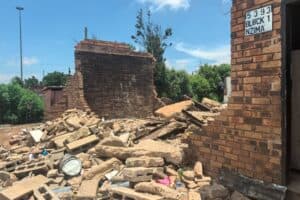An energy activist believes the Gauteng premier's desire to write off Soweto's debt is genuine, but not for the reasons you think.

The issue of Soweto’s historical electricity debt to Eskom has for the longest time been a thorny issue for both the Gauteng Provincial Government and residents alike.
Residents of Soweto have been calling for the total scrapping of the debt, believed to be in the region of R4 billion.
Marches have also been held by irate residents who have complained about poor service delivery from Eskom regarding relentless power outages, caused by either load reduction or transformers that have blown up.
Gauteng premier Panyaza Lesufi has in the past been vocal about the electricity issues there, calling on those who can afford to pay to do so, while a solution to the problem is being sought.
Load shedding the least of Soweto’s problems
Socialist and anti-apartheid activist Dr Trevor Ngwane says one of the main reasons behind some residents refusing to pay for electricity is because of what they describe as poor services from the power utility.
“For example, every winter season, and this is long before load shedding started hitting us, residents would experience power failures and simply because Eskom was failing to upgrade their infrastructure and the more people moved to Soweto from other areas, substations and transformers were not being upgraded.
“Also, when repairs are needed, Eskom would take very long to go and sort out the problems and most recently, in a place called Sun Valley, residents there stayed for 14 months without electricity because their transformer was faulty… so this is usual in Soweto that there are power failures over and above load shedding,” said Ngwane.
Soweto residents punished with load reduction?
“The amazing thing is that Eskom under Andre de Ruyter came up with a type of load shedding, specifically geared towards black – class areas called load reduction, and the reason they give for that is – those areas where there are illegal connections or where there is overcrowding – have to be reduced in terms of the load because they pose a bigger danger to the grid.
“We at the University of Johannesburg (UJ) found out when we conducted research, that if in Sandton there is 2 hours of load shedding, for a guy in Tembisa and Soweto there is 10 hours of load shedding,” said Ngwane.
ALSO READ: Parties slam Eskom’s ‘permanent’ load shedding plan for next 2 years
Lesufi may be genuine in his concerns
Referring to Lesufi’s concerns about the Soweto electricity conundrum, Ngwane said he believes the premier truly wants to solve the problem, though his motives may not be completely innocent.
“He is genuine in as far as 2024, and the loss of power for the ANC is a reality, and he is under pressure because he thinks that Gauteng ANC will lose more votes, hence, he wants to be seen as resolving residents’ issues.
“He is also presenting himself as ‘Mr Fixit’ and it’s not only electricity issues, even on the issue of crime, he promised he is going to buy six helicopters to fight crime. So, on the one hand he is genuine in wanting to solve Soweto’s problems, while on the other hand – but there is also an element of electioneering and real fear and desperation that something must be done to help the people of Soweto and Gauteng at large.”
Meanwhile, Eskom in Gauteng says it’s continuing to implement its revenue collection and debt management strategies, which include network audit operations, disconnection of illegal connections, and removal of bypasses on meters for which a remedial charge sheet is issued to the offending customer.
“This is mainly aimed at managing the debt and to avoid it from ballooning any further, while also collecting revenue from customers that have been converted to prepaid.
“Customer purchase patterns and energy consumptions are monitored on a constant basis so as to timeously pick up low or non-purchases and react where there appears to be an imbalance between revenue collected and the energy delivered to the area,” Eskom Gauteng spokesperson Amanda Qithi told The Citizen.
She said further to this, Eskom also ensures that where any network equipment is replaced, split metering is installed to curb unauthorised and illegal operation on its infrastructure with the view to thwart energy losses, and to stop the financial bleeding related to the theft of electricity.
Watch a previous interaction with the community below, courtesy of eNCA:
No one has asked Eskom to write off the debt
Asked if Eskom has been approached over calls for the scrapping of Soweto’s debt and whether or not it is something they will entertain, Qithi replied:
“Eskom has not been approached regarding scrapping the debt.
“Write-offs are a normal financial process that is followed if debt cannot be collected and Eskom complies to the Prescription Act 68 of 1969, as well as the National Credit Act 34 of 2005 pertaining to write-offs.”
Meanwhile Eskom says municipalities defaulting on their massive debt burden is exacerbating its cash flow crisis.
ALSO READ: Emfuleni and Tshwane R7.1bn debt exacerbating Eskom cash flow crisis
It was revealed this week that eight Gauteng municipalities owe the state-owned entity over R8 billion.
This amounts to 18% of the R50 billion owed to Eskom by municipalities and government departments across the country up until November last year.
The municipalities are:
- Emfuleni – R5.7 billion
- City of Tshwane – R999 million
- Rand West – R795 million
- Merafong – R658 million
- City of Ekurhuleni – R253 million
- Mogale City – R186 million
- Lesedi – R89 million
- City of Johannesburg – R6 million






